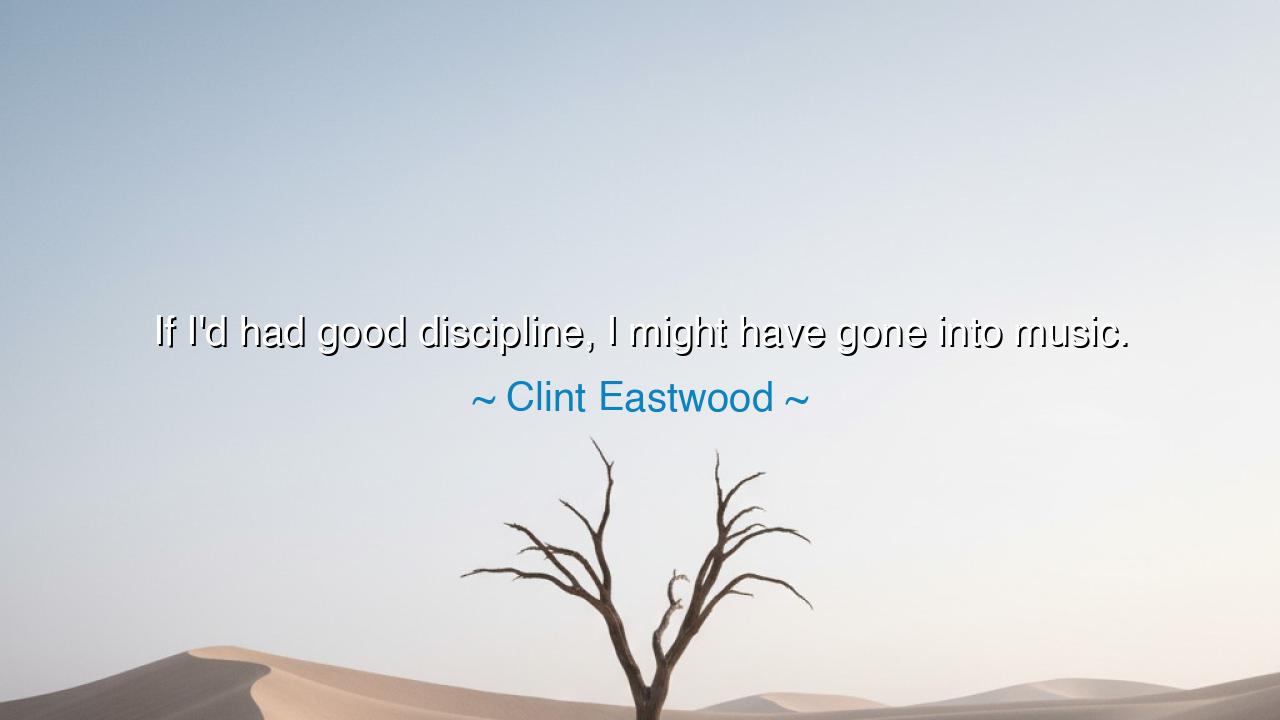
If I'd had good discipline, I might have gone into music.






Hear the words of Clint Eastwood, a man of iron will and weathered silence, who once said: “If I’d had good discipline, I might have gone into music.” At first these words may seem light, perhaps even casual, but beneath them lies the gravity of human truth. For in them we see the eternal dance between talent and discipline, between the spark of desire and the steady fire of perseverance. Many are born with the gift of song, the hand for art, the mind for creation—but without the harness of discipline, their gifts drift like leaves upon the wind.
Eastwood, a master of cinema, a figure of myth upon the screen, speaks here not of his triumphs, but of a path left untaken. He loved music, yet confesses that the lack of discipline barred him from fully embracing it. This is no small confession, for it teaches us that even the strong, even the great, recognize the weight of discipline as the key to mastery. Desire alone is not enough. Passion alone is not enough. Without discipline, passion burns bright for a moment and fades, while discipline turns passion into a sun that lights the world.
History has shown this again and again. Consider Wolfgang Amadeus Mozart, born with an almost divine gift for music. His genius was unparalleled, yet even he required discipline—the endless hours at the keys, the rigors of practice demanded by his father, the refinement of raw talent into immortal art. Without that discipline, his brilliance might have been scattered, dazzling but incomplete. It was discipline that carved genius into eternity.
Or think of the great Bruce Lee, whose body and art seemed godlike in speed and power. Yet he did not become legend through talent alone. He said, “I fear not the man who has practiced 10,000 kicks once, but the man who has practiced one kick 10,000 times.” In this he revealed the same truth Eastwood confessed: that discipline is the bridge between dream and reality. Lee’s greatness was not born in the fight, but in the endless hours of practice, repetition, and will.
The lesson in Eastwood’s words is therefore double-edged. On one side, it humbles us: even the mighty can be limited by lack of discipline. On the other, it exhorts us: talent is not enough—we must cultivate the strength to practice, to endure, to train ourselves beyond comfort. Discipline is the soil in which the seed of talent grows; without it, the seed dies unfulfilled.
What then must you do, O seeker of wisdom? Ask yourself not only, What do I desire? but also, What am I willing to do each day to shape that desire into reality? Do not be deceived by the flash of talent or the sweetness of dreams. Instead, build habits. Rise early, labor faithfully, persist even when inspiration fails. Let discipline be your companion, for it is the quiet force that transforms longing into achievement.
Thus, let Eastwood’s words be a warning and a beacon. If he, a man who conquered film, laments the path untaken for lack of discipline, then we too must heed the call. Discipline is not chains, but freedom—the freedom to make your art, your calling, your destiny real. Embrace it, and you may walk not only the road before you, but also the one that others never dared to tread.






AAdministratorAdministrator
Welcome, honored guests. Please leave a comment, we will respond soon